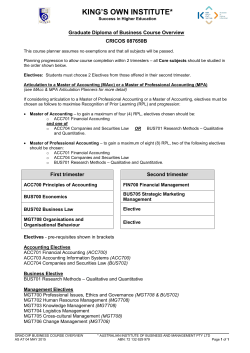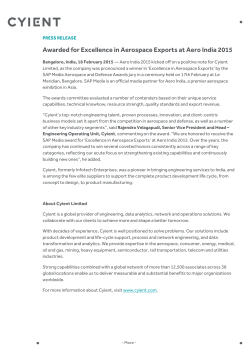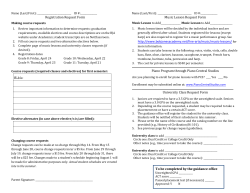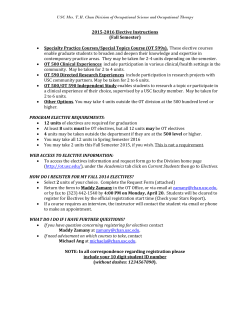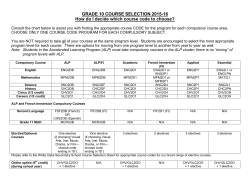
MAE Undergraduate Handbook - MAE
Mechanical and Aerospace Engineering Undergraduate Handbook Introduction Section I: Undergraduate Program in Mechanical and Aerospace Engineering (Accredited by the Engineering Accreditation Commission of ABET, http://www.abet.org) The Department of Mechanical and Aerospace Engineering offers both a standard Mechanical Engineering curriculum leading to a BS degree in Mechanical Engineering, and an Aerospace or Energy Concentration, which culminates with a BS degree in Mechanical Engineering and an Aerospace or Energy Certificate. Students who select the Aerospace or Energy concentration will be required to include in their departmental electives three courses related to the aerospace or energy fields. In addition, they take an aerospace or energy lab in their senior year in lieu of one standard senior lab. Details of the standard curriculum and aerospace or energy options are presented in Section II: The MAE Curriculum. Throughout the Mechanical Engineering curriculum, every effort is made to fulfill the department's educational objectives, namely: 1. To educate and train students in Mechanical Engineering in a technically sound, challenging and professional manner 2. To prepare students to enter careers ready to make positive contributions to their professions and society, or to continue on to successful graduate research and education 3. To inculcate in students the responsibilities and rewards associated with an engineering career and life-‐long service to the profession. Where each student graduating from the Mechanical Engineering program would have demonstrated: (a) an ability to apply knowledge of mathematics, science, and engineering (b) an ability to design and conduct experiments, as well as to analyze and interpret data (c) an ability to design a system, component, or process to meet desired needs within realistic constraints such as economic, environmental, social, political, ethical, health and safety, manufacturability, and sustainability (d) an ability to function on multi-‐disciplinary teams (e) an ability to identify, formulate, and solve engineering problems (f) an understanding of professional and ethical responsibility (g) an ability to communicate effectively (h) the broad education necessary to understand the impact of engineering solutions in a global, economic, environmental, and societal context (i) a recognition of the need for, and an ability to engage in life-‐long learning (j) a knowledge of contemporary issues 1 (k) an ability to use the techniques, skills, and modern engineering tools necessary for engineering practice. Design and Manufacturing Project Students during the senior year should register for the sequence of two courses: 650:467 Design and Manufacturing Project I (2cr) during Fall Semester and 650:468 Design and Manufacturing Project II (2cr) during Spring Semester. Successful completion of these courses is a graduation requirement. Fall Registration: Student should select a section from the list of available projects available on the MAE website: http://mech.rutgers.edu/sites/default/files/Senior%20Design%20Projects%2014 -‐15%20%281%29.pdf There is a limit of 5-‐8 students per section depending on the project. Once the limit is reached the section will be closed. The students in the section will constitute a group that will work together towards the design and manufacturing of the project prototype. If the section of your first preference is closed, please select your subsequent choice. Spring Registration Register for the same section as in the Fall Semester. 2 Section II: MAE Curriculum The Department of Mechanical and Aerospace Engineering offers a Mechanical Engineering Curriculum leading to a BS degree in Mechanical Engineering. All Mechanical Engineering Students have a broad selection of Departmental Electives, which can be selected according to the students' interests and career goals. The MAE Department also offers two additional concentrations in Aerospace and Energy Systems. 1. Standard Curriculum: Students following this option are required to take any 3 Departmental Electives. In addition, students take Mechanical Engineering Laboratories II (14:650:432) in the final spring semester of senior year. Students completing the requirements for this option receive a Mechanical Engineering degree/diploma. 2. Aerospace Concentration: Students following this concentration are required to select only Aerospace Electives1 as Departmental Electives. In addition, students under this concentration take Aerospace Engineering Laboratories (14:650:433) instead of Mechanical Engineering Laboratories II. Students completing the requirements for this concentration receive an Aerospace certificate in addition to their Mechanical Engineering Diploma. 3. Energy Systems Concentration: Students following this Concentration are required to select only Energy Systems Electives2 as Departmental Electives. In addition, students under this concentration take Energy Systems Engineering Laboratories (14:650:435) instead of Mechanical Engineering Laboratories II. Students completing the requirements for this concentration receive an Energy Systems certificate in addition to their Mechanical Engineering Diploma. See course objectives and descriptions for further details on engineering (650) courses. Electives for Mechanical Engineers: Departmental, Technical, Humanities/Social Science, General A. Departmental Electives are 300/400 level mechanical engineering (650:xxx) courses that are not already required in the curriculum. Students must take 3 Departmental Electives. (Aerospace Electives1, Energy Electives2) Fall Electives (Annual) 401 -‐ Mechanical Control Systems 449 -‐ Intro. to Mechanics of Composite Materials 455 -‐ Design of Mechanisms 462 -‐ Power Plants2 474 -‐ Alternative Energy I2 460 -‐ Aerodynamics1 471 -‐ Aircraft Flight Dynamics 3 Fall Electives (Biannual) 447 -‐ Probabilistic Models in Mechanical and Aerospace Systems (Even Years)1 451 -‐ Vehicle Dynamics (Odd Years) Spring Electives (Annual) 458 -‐ Aerospace Structures1 461 -‐ Internal Combustion Engines2 465 -‐ Orbital Mechanics1 478 -‐ ME Aspects of Electronic Packaging 477 -‐ Alternative Energy II2 Spring Electives (Biannual) 463 -‐ Compressible Fluid Dynamics (Odd Years)1 459 -‐ Aerospace Propulsion (Even Years)1 B. Technical Electives are those upper level technical courses appropriate for mechanical engineers. The MAE curriculum requires two (2) technical electives to be chosen from the list of this booklet. Any extra departmental electives course may be used as a technical elective. A student may take Special Problems in Mechanical Engineering (650:491, 492), as technical electives with approval of a professor supervising the work, to a limit of 3 credits in the senior year. C. Humanities/Social Science Electives are intended to serve the objectives of a broad education, and to make engineers fully aware of their social responsibilities and better able to consider related factors in the decision-‐making process. The CEE curriculum contains 18 credits of Humanities/Social Science Electives, which must include 355:101 Expository Writing and 220:102 Microeconomics. At least 6 credits must be at an advanced level (300 level or higher). A list of acceptable Humanities/Social Science Electives courses is provided on the School of Engineering website at http://soe.rutgers.edu/oas/electives. D. General Electives may be almost any course taught for credit at Rutgers University qualifies as a general elective. There are, however, a few exceptions in certain subject areas. See the School of Engineering website for details: http://soe.rutgers.edu/oas/electives. 4 MECHANICAL ENGINEERING CURRICULUM (131 CR) Freshman Year 160:159 Gen.Chem. for Engrs 3 160:160 Gen. Chem for Engrs. 160:171 Intro. Experimentation 1 440:127 Intro.Computers for Engrs 355:101 Expository Writing 3 640:152 Calculus for Eng'g 440:100 Intro. to Engineering 1 440:221 Eng'g Mech (Statics) 640:151 Calculus for Eng'g 4 750:124 Analytical Physics Ib 750:123 Analytical Physics Ia 2 _______ Hum/Soc Elective ______ Hum/Soc Elective 3 Sophomore Year 640:251 Multivariable Calculus 4 332:373* Elem. of Elect. Eng'g 650:231* M.E. Comp Anal& Des. 3M 332:375* Elem. Elect. Eng'g Lab 440:222* Eng'g Mech (Dynamics) 3 650:215* Computer Aid Drafting 750:227 Analyt. Physics IIa 3 640:244 Differential Equations 750:229 Analyt. Physics IIa Lab 1 650:291* Intro. Mech. Materials ________ Hum/Soc Elective (300+) 3 750:228 Analyt. Physics IIb 750:230 Analyt. Physics IIb lab Options: Standard Aerospace Energy Junior Year 540:343 Engineering Econ 3M 635:407 Mech. Prop. Materials 640:421 Advanced Calculus 3M 650:342* Design Mech Components 650:312* Fluid Mechanics 3M 650:351* Thermodynamics 650:350* ME Measurements 4M 650:388* CAD in Mech Eng’g _______ Hum/Soc Elective (300+) 3 220:102 MicroEconomics Senior Year 650:431 ME Lab I 2M 650:432/3/5 ME/Aero/Energy Lab II 650:467 Engineering Projects I 2M 650:468 Engineering Projects II 650:481* Heat Transfer 3M 650:443* Vibrations and Controls 650:4___* Dept/Aero/Energy Elec 3M 650:4___* Dept/Aero/Energy Elec 650:4___* Dept/Aero/Energy Elec 3M ________⌘ Technical Elective ⌘ 3 ________ General Elective ________ Technical Elective 3 3 4 3 2 3 3M 1M 1M 4 3M 3 1 3M 3M 3M 3M 3 2M 2M 3M 3M 3 3 • • The MAE courses marked with (*) above can be taken either fall or spring semester If the Technical Elective marked with (⌘) is an MAE course then its grade counts towards the Major GPA • All MAE Departmental Electives can count for Technical Electives Aerospace Departmental Option Courses 650:447 650:458 650:459 650:460 650:463 650:465 650:449 650:471 Prob Models in AE Systems Aerospace Structures Aerospace Propulsion Aerodynamics Compressible Fluid Mechanics Orbital Mechanics Intro to Mech of Comp Mate Aircraft Flight Dynamics Energy Departmental Option Courses 650:461 -‐ Internal Combustion Engines 650:462 -‐ Power Plants 650:474 -‐ Alternative Energy I 650:477 -‐ Alternative Energy II 5 TECHNICAL ELECTIVES Take two courses from the science/engineering courses offered by the departments below. Code 105 115 117 119 125 146 155 160 180 198 216 332 375 Dept Astrophysics Biochemistry Bioenvironmental Engineering Biological Sciences Biomedical Engineering Cell Biology and Neuroscience Chemical and Biochemical Engineering Chemistry Civil and Environmental Engineering Computer Science Ecology, Evolution, and Natural Resources Electrical and Computer Engineering Environmental Sciences 400 Food Science 440 General Engineering (Packaging) 447 460 540 628 635 640 650 680 694 750 776 960 Courses 300+, 400+ 300+, 400+ 413, 414, 462, 468, 474, 492, 494, 495, 496 115, 116, 155, 408, 409 300+, 407 200+, 300+, 400+ 400+ 209, 251, 300+, 400+ 243, 300+, 400+ 200+, 300+, 400+ 240, 401, 405, 431, 454, 486 226, 231/3, 252/4, 300+, 400+ 202, 203, 302, 303, 307, 322, 340, 346, 360, 406, 407, 411, 421, 423, 424, 430, 434, 444, 453 201, 202, 301, 302, 304, 411, 419 301, 302, 371, 373, 378, 403, 406, 408, 419, 420, 468, 471 Genetics 200+, 300+ (excluding 354), 400+ Geology 301, 304, 306, 402, 407, 414, 418 Industrial and Systems Engineering 200+, 300+, 400+ (excluding 461) Marine Sciences 320, 472 Materials Science and Engineering 200+ (excluding 206), 300+, 400+ Mathematics 250, 300+, 400+ Mechanical and Aerospace Engineering 300+, 400+ Microbiology 390, 480, 481, 494 Molecular Biology and Biochemistry 200+, 300+ (excluding 383), 411-‐414 Physics (Physics and Astronomy) 300+, 400+ (excluding 443, 444) Plant Science 242, 305 Statistics 211, 212, 285, 379, 381, 382, 384, 400+ Note 1: In all course above, seminars are excluded from counting for TEs 6 Section III: Professional and Supplemental Programs Dual Degree, Double major, and Minor programs: Minors, majors, and dual degrees provide students with the opportunity to broaden skill sets outside of engineering. These programs are offered in conjunction with various other undergraduate schools at Rutgers University, including the School of Arts and Sciences and the School of Environmental and Biological Sciences. For more information about these programs, see http://soe.rutgers.edu/oas/minors-‐majors BS/Master’s programs: There are three special joint programs offering the opportunity for engineering students to obtain a Master’s degree within one calendar year of completing the baccalaureate degree requirements. Qualified School of Engineering students are eligible to apply for admission to these accelerated Master's Programs in their junior year. For more information, see http://soe.rutgers.edu/oas/BS-‐Masters The James J. Slade Scholars Program: In the third year, students who have maintained a 3.2 university cumulative grade-‐point average may apply to the undergraduate director of their major department to be admitted into the James J. Slade Scholars Program. The Slade Scholar Program honors long-‐time School of Engineering faculty member James J. Slade who was a noted researcher, mathematician, and professor for 36 years. His commitment to teaching, scholarly excellence, and impact on students was legendary, and continues to resonate through this prestigious research program. Each Slade Scholar prepares a plan of study under the guidance of a three-‐member faculty committee and the Honors Committee of the School of Engineering. The chairperson of the student's committee shall be the research thesis adviser and should be a member of his or her major department. For more information, see http://soe.rutgers.edu/oas/slade. Study Abroad: Many engineering students take advantage of Rutgers' Study Abroad educational opportunities choosing to study for a semester, a summer, or an academic year at one of the many international programs open to Rutgers students. Students can study abroad as early as sophomore year at locations including Hong Kong, Australia, London, South Africa, and more. Orientation sessions provide valuable information for making the necessary educational and logistical plans. For more information, see: http://soe.rutgers.edu/oas/study-‐abroad. 7 Co-‐op -‐ Cooperative Education: Engineering students who have completed required major courses through the first semester of the junior year and have a cumulative GPA of at least 2.5 are eligible to participate in the Co-‐op program. The MAE Co-‐op requires that students complete a 6-‐month, full-‐time (40 hrs/wk) work experience in a corporate engineering position, which may earn 6 credits towards technical electives (see Note 6) if the student registers for the Co-‐op in Mechanical and Aerospace Engineering course (650:496/7). The MAE department requires continuous summer-‐fall or spring-‐summer experience. After a student finds an engineering position in the company of his/her liking the following steps should be accomplished for technical elective credits in MAE: • Submit job description for approval to the MAE undergraduate office. • Complete Co-‐Op MAE form (this form is different from the Career Services one.) http://mech.rutgers.edu/sites/default/files/Co-‐Op%20Application.pdf • After approval of job description, register for 650:496/497. • Upon completion of the internship the student should submit at the MAE undergraduate office the following: o A technical report of a minimum length of 20 pages (including tables, figures and references.) o An evaluation letter from his/her supervisor indicating: 1) length and full time employment of the student, 2) his/her duties, and 3) assessment of his performance. Note 2: Since this is a full time job the students are not encouraged to take courses during their co-‐op experience. If under extenuating circumstances a student is to take a course during his/her Co-‐Op, the student is reminded that all MAE classes have mandatory attendance and no credit will be given for missed classes. The Office of Career Services provides listings of co-‐op opportunities, but students may also obtain positions on their own. For more information, see: http://soe.rutgers.edu/oas/coop. Note 3: No credit towards electives in MAE will be given if the student is not registered for 650:496/7. 8 Internship Experience: Engineering students who have completed required major courses through the sophomore year and have a cumulative GPA of at least 2.5 are eligible to participate in the Internship program. The MAE Internship requires that students complete a 3-‐month, full-‐time (40 hrs/wk) work experience in a corporate engineering position, which may earn 3 credits towards a technical elective (see Note 6) -‐ if the student registers for the Internship in Mechanical and Aerospace Engineering course (650:495). After a student finds an engineering position in the company of his/her liking the following steps should be accomplished to earn technical electives credits in MAE: • Submit job description for approval to the MAE undergraduate office. • Complete the MAE Internship form (this form is different from the Career Services one.) http://mech.rutgers.edu/sites/default/files/Internship%20%20Application.pdf After approval of job description, register for 650:495. • • Upon completion of the internship the student should submit at the MAE undergraduate office the following: o A technical report of a minimum length of 20 pages (including tables, figures and references.) o An evaluation letter from his/her supervisor indicating: 1) length and full time employment of the student, 2) his/her duties, and 3) assessment of his performance. Note 4: Since this is a full time job the students are not encouraged to take courses during their internship experience. If under extenuating circumstances a student is to take a course during his/her internship, the student is reminded that all MAE classes have mandatory attendance and no credit will be given for missed classes. The Office of Career Services provides listings of internship opportunities, but students may also obtain positions on their own. Note 5: No credit towards electives in MAE will be given if the student is not registered for 650:495. 9 Undergraduate Research: This experience seeks to expand student participation in research projects with mechanical and aerospace engineering faculty. It features high-‐quality interaction of students with faculty, access to appropriate facilities, and other professional development opportunities. Students may earn up to 3 credits (total) counting towards a technical elective (see Note 6) in MAE if they register under 298, 398, 498 Undergraduate research during the Fall semester and/or 299, 399, 499 Undergraduate research during the Spring semester of their sophomore, junior and senior years, respectively. Note 6: Total number of Undergraduate Research/Internship/Co-‐Op experience credits that may count towards a Technical Elective is limited to 6 credits (2 TEs). 10 Mechanical and Aerospace Engineering Rutgers University Prerequisites Course Code 160:159 160:160 160:171 Course name Seme ster Option Gen Chem for Engs I Gen Chem for Engs II Intro to Experimentation 220:102 Microeconomics 332:373 332:375 355:101 440:100 440:127 440:221 440:222 Elem of Electrical Eng’g Elem of Electrical Eng’g Lab Expository Writing Intro to Eng Intro to Comp for Engs Engineering: Mechanics: Statics Engineering Mechanics: Dynamics 540:343 Engineering Economics 635:407 640:151 Mech Properties of Materials Calculus I for Eng’g 640:152 640:251 640:244 640:421 750:123 750:124 750:227 Calculus II for Eng’g Multivariable Calculus Differential Equations Advanced Calculus Analytical Physics Ia Analytical Physics Ib Analytical Physics IIa 750:228 Analytical Physics IIb 750:229 750:230 650:215 650:231 650:291 650:312 Analytical Physics IIa Lab Analytical Physics IIb Lab Computer Aided Drafting ME Comp Analysis & Design Intro to Mech of Mate Fluid Mechanics S S S S Core Core Core Core 650:342 Design Mech Components S Core S S S S S 11 Prerequisite 01:640:026 or equivalent 01:160:171 01:160:159 or 01:160:161 or 01:160:163 01:640:111 or 01:640:115 or calculus placement 01:640:152 or 02:750:227 01:640:152 None None None 01:640:151 or 01:750:123 01:640:151 AND 01:640:152 AND 01:750:124 AND 14:440:221 Open only to junior and senior engineering students 14:440:221 AND 14:650:291 01:640: 112 or 01:640:115 or appropriate performance on the placement test in mathematics 01:640:151 01:640:152 01:640:251 01:640:244 Co-req: 01:640:151, 01:640:152 01:750:123 (01:750:123 AND 01:750:124) OR 01:750:271 Co-req: 01:750:229 (01:750:227 or 01:750:204 or 01:750:272) Co-req: 01:750:230 Co-req: 01:750:227 Co-req: 01:750:228 None 14:440:127 or 01:198:107 14:440:221 or 14:440:291 (01:640:244 or 01:640:292 or 50:640:314) AND 14:440:222 OR (01:640:244 or 01:640:292 or 50:640:314) AND 14:440:292 (14:440:222 AND 14:650:231 AND 14:650:291) Updated 04/25/15 File: MAE Prereq Table.docx 650:350 650:351 ME Measurements & Lab Thermodynamics S S Core Core 650:361 Intro to Mechatronics ASp Elective (may replace 332:373/375) OR (14:440:292 AND 14:650:231 AND 14:650:291) OR (14:440:222 AND 14:650:231 AND 14:180:243) OR (14:440:292 AND 14:650:231 AND 14:180:243) 14:332:373 AND 14:332:375 (01:640:244 AND 01:750:228 AND 01:750:230) OR (01:640:244 AND 01:750:228 AND 01:750:230 OR (01:640:244 AND 01:750:228 AND 01:750:230 OR (01:640:244 AND 01:750:228 AND 01:750:230) (01:640:152 AND 01:640:244 AND (01:750:227) 650:388 650:401 CAD in Mech Eng’g Mechanical Control Systems S AF Core Mech 650:431 ME Lab I AF Core 650:432 MAE LAB II (ME option) ASp Mech 650:433 MAE LAB II (AE option) ASp Aero 650:435 MAE LAB II (Energy option) ASp Energy 650:443 Vibrations and Controls S Core 650:447 650:449 650:451 Probabilistic models in MAE Intro to Mech of Comp Mate Vehicle Dynamics Aero/Mech Aero/Mech Mech 650:455 650:458 650:459 650:460 650:461 650:462 650:463 Design of Mechanisms Aerospace Structures Aerospace Propulsion Aerodynamics Internal Combustion Engines Power Plants Compressible Fluid Mechanics BF(E) AF BF(O ) AF ASp BS(E) AF ASp AF BS(O 14:650:215 (01:640:244 or 01:640:292 or 50:640:314) AND (14:440:222) OR (01:640:244 or 01:640:292 or 50:640:314) AND (14:440:292) (14:650:291) AND (14:650:312) AND (14:650:350) AND (14:650:351) (14:650:291) AND (14:650:312) AND (14:650:350) AND (14:650:351) (14:650:291) AND (14:650:312) AND (14:650:350) AND (14:650:351) (14:650:291) AND (14:650:312) AND (14:650:350) AND (14:650:351) (14:440:222 AND 01:640:421 AND 14:650:291) OR (14:440:292 AND 01:640:421 AND 14:650:291) 01:640:421 14:650:291 14:440:222 or 14:440:292 Mech Aero/Mech Aero/Mech Aero/Mech Energy/Mech Energy/Mech Aero/Mech 14:440:222 or 14:440:292 01:640:244 AND 14:650:291 14:540:312 AND 14:650:351 14:650:312 AND 14:650:351 14:650:312 AND 14:650:351 14:650:351 14:650:312 AND 14:650:351 12 Updated 04/25/15 File: MAE Prereq Table.docx 650:465 650:467 Orbital Mechanics Design & Manufacturing I ) ASp AF Aero/Mech Core 650:468 650:471 Design & Manufacturing II Aircraft Flight Dynamics ASp AF Core Aero/Mech 650:474 650:477 659:478 650:481 Alternative Energy I Alternative Energy II ME Aspects to Electronic Packaging Heat Transfer AF ASp ASp S Energy/Mech Energy/Mech Mech Core 650:485 Computing Environment ASp Elective 14:650:312 AND 14:650:351 14:650:231 AND 14:650:342 AND 14:650:388 14:650:467 14:440:221 AND 14:440:222 AND 01:640:421 OR 14:440:291 AND 14:440:292 AND 01:640:421 14:650:351 14:650:351 14:650:342 AND 14:650:351 01:640:421 AND 14:650:312 AND 14:650:351 14:650:231 AND 14:650:342 Undergrad Research/Internship/Co-Op/ JJ Slade Courses 650:298 650:299 650:398 650:399 650:498 650:499 UG Research for Soph UG Research for Soph UG Research for Jrs UG Research for Jrs UG Research for Srs UG Research for Srs AF ASp AF ASp AF ASp Elective Elective Elective Elective Elective Elective 650:495 Internship in MAE S Elective 2.5 GPA & approval of job description 650:496 Co-Op in MAE AF Elective 650:497 Co-Op in MAE ASp Elective 2.5 GPA & approval of job description 2.5 GPA & approval of job description 650:542 650:543 JJ Slade Research JJ Slade Research AF ASp Elective Elective Legend S AF ASp BF(E) BF(O) BS(E) BS(O) 3.2 GPA 3.2 GPA Semester Annual Fall Annual Spring Biannual Fall (Even Years) Biannual Fall (Odd Years) Biannual Spring (Even Years) Biannual Spring (Odd Years) 13 Updated 04/25/15 File: MAE Prereq Table.docx SAS Course Descriptions CHEMISTRY 1:160:159-160 General Chemistry for Engineers (3,3) Introduction to chemical principles and their application. Includes stoichiometry, states of matter, atomic and molecular structure, solutions, thermodynamics, equilibrium, oxidationreduction, kinetics, nonmetals, metals and coordination compounds, and nuclear chemistry. Lec. 2 hrs., rec. 1 hr. Prerequisite for 159: 01:640: 026 OR equivalent. Pre- OR corequisite for 160: 01:160:171. 01:160:171 Introduction to Experimentation (1) Laboratory illustrating basic chemical methods. Lab. fee required. Lab. 3 hrs. Pre- OR corequisite: 01:160:159, 161, OR 163. MATHEMATICS 01:640:151-152 Calculus for Mathematical and Physical Math 151: Same topics as 01:640:135, with additional theory and numerical applications. Math 152: Techniques of integration, elementary differential equations, sequences, infinite series, Taylor series, parametric equations, polar coordinates. For mathematics, physics, computer science, statistics, chemistry, OR engineering majors. Prerequisite for 151: 01:640: 112 OR 115 OR appropriate performance on the placement test in mathematics. Prerequisite for 152: CALC1. Credit restrictions: CR1, CR2. 01:640:251 Multivariable Calculus (4) Analytic geometry of three dimensions, partial derivatives, optimization techniques, multiple integrals, vectors in Euclidean space, and vector analysis. Prerequisite: CALC2. Credit restriction: CR3. 01:640:244 Differential Equations for Engineering and Physics (4) First- and second-order ordinary differential equations; introduction to linear algebra and to systems of ordinary differential equations. Prerequisite: CALC3. Credit restriction: CR4. 01:640:421 Advanced Calculus for Engineering (3) Laplace transforms, numerical solution of ordinary differential equations, Fourier series, and separation of variables method applied to the linear partial differential equations of mathematical physics (heat, wave, and Laplace's equation). Primarily for mechanical engineering majors. Prerequisite: CALC4. Credit not given for both this course and 01:640:423. PHYSICS 01:750:123-124 Analytical Physics I (2,2) Forms a thorough introductory sequence together with 01:750:227, 228. Kinematics, dynamics, energy, momentum, angular momentum, heat, and kinetic theory. Lec. 1 hr., rec. 1 hr. Corequisites: 01:640:151-152. Primarily for engineering and physics majors. This course should be followed by 01:750:227, 228 (OR 204 if changing major). 01:750:227 Analytical Physics IIA (3) Electrostatics, particles in electric and magnetic fields, electromagnetism, circuits, Maxwell's equations, electromagnetic radiation. Prerequisites: 01:750:123-124 OR 271. Corequisite: 01: 750:229. Primarily for engineering and physics majors. 01:750:228 Analytical Physics IIB (3) Waves and optics, relativity, quantum properties of electrons and photons, wave mechanics, atomic, solid state, nuclear, and elementary particle physics. Prerequisite: 01:750:227 OR 204 OR 272. Corequisite: 01:750:230. Primarily for engineering and physics majors. 01:750:229-230 Analytical Physics II Laboratory (1,1) Laboratory to complement 01:750:227 and 228. Coreqs: 01:750:227 and 228. 14 Updated 04/25/15 File: MAE Prereq Table.docx SOE First/Second Year Course Descriptions 14:440:221 Engineering Mechanics: Statics (3) Classification of systems of forces and their resultants; geometrical and analytical conditions for the equilibrium of force systems; frames and trusses; friction; parabolic and catenary cables; centers of gravity. Prerequisites: 01:640:151 or 153 or 191; and 01:750:115 or 123 or 203. 14:440:222 Engineering Mechanics: Dynamics (3) Kinematics of particles and rigid bodies; rectangular, path, and polar descriptions. Relative motion. Kinetics of particles, particle systems, and rigid bodies; equations of motion, principles of work and energy, linear and angular impulse and momentum. Impact. Prerequisites: 01:640:152 or 154 or 192 or 50:640:122 or 21:640:136; and 14:440:221 or 291. 14:440:291 Honors Engineering Mechanics: Statics (3) Covers the same material as 14:440:221 but in a more thorough and demanding fashion. Open only to honors program participants. 14:440:292 Honors Engineering Mechanics: Dynamics (3) Covers the same material as 14:440:222 but in a more thorough and demanding fashion. Open only to honors program participants. 15 Updated 04/25/15 File: MAE Prereq Table.docx
© Copyright 2025

